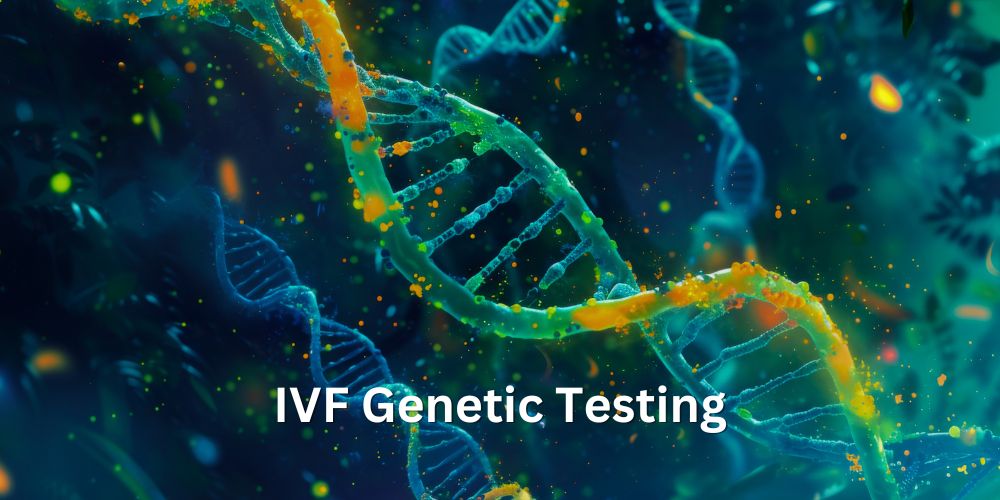In vitro fertilization (IVF) has opened new doors for couples struggling with infertility. One of the critical advancements in this field is genetic testing, which can significantly increase the chances of a successful pregnancy and reduce the risk of genetic disorders. This guide explores the various aspects of genetic testing in IVF, including its benefits, who should consider it, and how it works.
What is IVF genetic testing?
Genetic testing in IVF involves screening embryos for genetic disorders and chromosomal abnormalities before implantation. The Genetic Testing process helps identify the healthiest embryos, increasing the chances of a successful pregnancy.
Evaluating egg quality through genetic testing provides critical insights that can enhance fertility treatments and outcomes. By understanding the genetic factors that influence egg quality, women can make informed decisions about their reproductive health and increase their chances of successful conception and a healthy pregnancy.
Fertility experts use preimplantation genetic screening in IVF to enhance the chances of a successful pregnancy and reduce the risk of genetic disorders. By analyzing the genetic makeup of embryos before implantation, specialists can identify and select the healthiest embryos, thus increasing the likelihood of implantation and a viable pregnancy. This approach is particularly beneficial for older women, those with a history of recurrent miscarriages, or individuals with a family history of certain genetic diseases. Genetic testing aims to screen embryos for abnormalities that could lead to failed implantation, miscarriage, or genetic disorders in the baby.
Who Should Get Genetic Testing?
PGD is especially crucial for individuals with known genetic conditions. For example, you may have been told that you have a 1 in 2 or 1 in 4 chance of having a child with autosomal dominant or recessive conditions. Autosomal dominant conditions are likely to be passed from an affected parent to their child, while autosomal recessive conditions occur when both parents carry a single copy of a harmful gene, potentially resulting in a sick child if combined.
These are important questions to discuss with your provider to determine the need for genetic testing and make informed reproductive decisions.
However, the benefit of genetic testing can vary based on your age and the number of embryos you have.
- Younger Women (e.g., Age 25): If you are younger and have many embryos, most of which are likely chromosomally normal, the yield from genetic testing might be lower. The benefit of identifying abnormal embryos is less significant because the majority are expected to be healthy.
- Older Women (e.g., Age 40): If you are older and generate fewer embryos, the decision becomes more nuanced. For example, if you produce only one embryo, the cost and potential strain of biopsying that single embryo might be less justified. However, if you produce multiple embryos, genetic testing can help select the healthiest ones, increasing the chances of a successful pregnancy.
What is the Purpose of IVF Genetic Testing?
When considering preimplantation genetic diagnosis (PGD), also known as preimplantation genetic testing (PGT), it’s important to understand the different types. When patients ask about genetic testing, they typically refer to PGT-A, which checks for abnormal chromosomes, or PGT-M, which screens for specific genetic diseases. The initial application of PGT-M was primarily to prevent the transmission of severe, untreatable, or life-threatening childhood-onset conditions.
Why is Genetic Testing Done for IVF?
Genetic testing during IVF aims to screen embryos for genetic abnormalities that could lead to failed implantation, miscarriage, or genetic disorders in the baby. Common tests include Preimplantation Genetic Testing for Aneuploidy (PGT-A) and Preimplantation Genetic Diagnosis (PGD), which help in identifying embryos with the correct number of chromosomes or specific genetic conditions.
PGT versus PGD Genetic Testing?
Preimplantation Genetic Testing (PGT) and Preimplantation Genetic Diagnosis (PGD) are both types of genetic testing performed on embryos created through in vitro fertilization (IVF). However, they serve different purposes and have distinct applications.
Preimplantation Genetic Testing (PGT) is a broader term that encompasses several types of genetic tests performed on embryos before implantation. The primary goal of PGT is to screen embryos for genetic abnormalities to improve the chances of a successful pregnancy.
Does Genetic Testing Increase IVF Success?
Yes, genetic testing can increase IVF success rates. PGT-A helps identify chromosomally normal embryos, which have a higher chance of successful implantation and healthy pregnancy. This is especially beneficial for older women or those with a history of recurrent miscarriages. According to the American College of Obstetricians and Gynecologists (ACOG), selecting euploid embryos increases the likelihood of a successful pregnancy and reduces the risk of miscarriage.
How Accurate is IVF Genetic Testing?
IVF genetic testing, including PGT-A and PGD, is highly accurate but not infallible. These tests can reliably identify many chromosomal abnormalities and genetic disorders. However, they have limitations. According to the American Society for Reproductive Medicine (ASRM), PGT-A cannot detect all types of chromosome abnormalities, such as microdeletions and microduplications, nor can it identify single-gene disorders. False positives and false negatives can occur, so prenatal diagnostic testing is recommended to confirm the results.
Evaluating Egg Quality: Genetic Insights and Fertility
Egg quality is a critical factor in fertility, significantly influencing the chances of successful conception and a healthy pregnancy. Genetic insights play a pivotal role in evaluating egg quality, providing valuable information for women considering or undergoing fertility treatments.
By understanding the genetic factors that influence egg quality, women can make informed decisions about their reproductive health and increase their chances of successful conception and a healthy pregnancy. Consulting with fertility specialists and genetic counselors can help navigate the complexities of genetic testing and develop personalized treatment plans tailored to individual needs.
The Importance of Egg Quality
High-quality eggs have the correct number of chromosomes, which is essential for normal fertilization and embryo development. Poor egg quality can lead to chromosomal abnormalities, increasing the risk of miscarriage and genetic disorders in the offspring. As women age, the quality and quantity of their eggs decline, making it more challenging to conceive.
Genetic Testing and Egg Quality
Genetic testing can assess the quality of eggs by examining the chromosomal makeup of the oocytes. Key techniques include:
- Karyotyping: This test evaluates the size, shape, and number of chromosomes in the egg cells. It helps identify chromosomal abnormalities that can affect fertility.
- Comparative Genomic Hybridization (CGH): CGH detects chromosomal imbalances in eggs, such as deletions or duplications, which can impact embryo viability.
- Next-Generation Sequencing (NGS): NGS provides a detailed analysis of the genetic material, identifying subtle chromosomal abnormalities that may not be detected by traditional methods.
Role of Genetic Testing in IVF
In the context of IVF, genetic testing of eggs can help:
- Select the Best Eggs: By identifying eggs with normal chromosomal patterns, fertility specialists can choose the best candidates for fertilization, increasing the chances of a successful pregnancy.
- Improve IVF Outcomes: Genetic insights can help tailor fertility treatments, enhancing the likelihood of producing high-quality embryos and reducing the risk of miscarriage.
- Understand Fertility Issues: For women experiencing unexplained infertility or recurrent miscarriages, genetic testing of eggs can provide answers and guide appropriate interventions.
Genetic Factors Affecting Egg Quality
Several genetic factors can influence egg quality, including:
- Aneuploidy: The presence of an abnormal number of chromosomes in the egg cells, often increasing with maternal age.
- Mitochondrial DNA Mutations: Abnormalities in the mitochondrial DNA can affect the energy production of the eggs, impacting their quality and viability.
- Inherited Genetic Disorders: Certain genetic mutations can be passed down through generations, affecting the quality of eggs and the health of the embryos.
By understanding these aspects of genetic testing in IVF, couples can make informed decisions, increasing the likelihood of a successful pregnancy and a healthy baby. Consulting with fertility specialists and genetic counselors can help navigate the complexities of genetic testing and develop personalized treatment plans tailored to individual needs.




